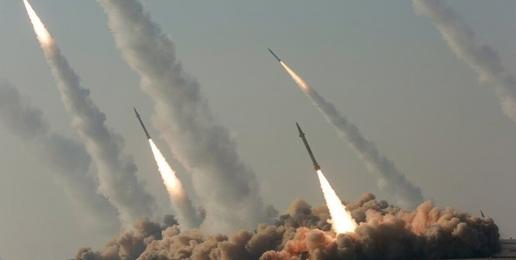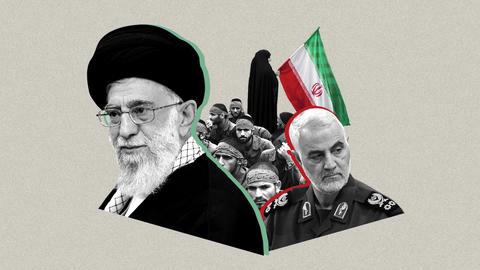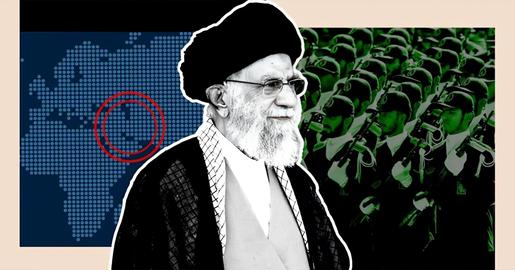For the first time since the 1980-88 Iran-Iraq war, a country launched this week an attack on Iranian soil.
While the Islamic Republic’s supreme leader and president have remained silent, the Iranian authorities are carefully using terms such as "occurrence" and "explosion" when addressing the matter.
The Pakistani airstrikes on Iranian soil, however, mark a pivotal moment and are poised to alter regional dynamics permanently.
The border between Iran and Pakistan had been characterized by a history of friendship and good neighborliness until the morning of January 16.
But the missile and drone attack by the Islamic Revolutionary Guard Corps (IRGC) on Pakistani territory earlier this week, and Pakistan’s subsequent military response have forever tarnished the previously peaceful relationship between the two neighbors.
The IRGC’s attack is also expected to have lasting negative effects on Iran's relations with other countries in the region as well.
Such a situation will pose challenges that even a democratic system enjoying both domestic and international legitimacy would have difficulties to overcome.
Pakistan's military action serves as a stark demonstration of the Iranian government's fragility.
Pakistan's military incursion showed:
The Islamic Republic’s inability to protect Iranian airspace
The air defense of the Islamic Republic either chose not to or couldn't thwart a military attack by a neighboring country.
This underscores the incapacity of the Islamic Republic to protect the country, evident to both its citizens and foreign governments.
IRGC's involvement in military aggression against Iran
The IRGC, which has launched a costly attack on Pakistan through its controversial missile program, not only failed to establish a military deterrent but also, for the first time during Ali Khamenei's 34-year leadership, provoked military aggression against Iran.
The Islamic Republic’s inability to provide strong diplomatic response
In contrast to Pakistan, which took strong diplomatic measures following the military attack by the Islamic Republic, Khamenei remained silent, offering no condolences for the civilian deaths in Iran.
President Ebrahim Raisi did not cancel his trip to Tehran's countryside and did not send condolences.
High-ranking officials’ failure to take a stance
The responsibility for commenting on Pakistan's attack was handed to Interior Minister Ahmad Vahidi, who downplayed the issue.
This contrasts sharply with the widespread reactions from senior Pakistani officials, highlighting the extremely weak position of the Islamic Republic.
Even the Iranian foreign minister refrained from reacting to Pakistan's attack, while the spokesperson of his ministry issued a weak condemnation.
The Pakistani attack will have enduring consequences on the foreign relations of the Islamic Republic, including:
The end of the non-aggression claim
The military attack on Pakistan shattered the Islamic Republic's historical claim that it never invaded or attacked any country.
The previous justifications for attacks in Syria and Iraq as acts of legitimate defense against opposition groups were rejected by Pakistan.
Military force becoming a factor of aggression
Instead of serving as a deterrent to aggression, the military power of the Islamic Republic is responsible for a neighboring country's military attack on Iran.
The IRGC's missile program, once a source of false confidence in military power, has become a factor diminishing Iran's deterrence capabilities.
Diplomacy held captive by adventurous generals
Military force is intended to be only a tool of foreign policy and diplomacy.
In Iran, however, the management of Iran’s foreign affairs is under the control of the IRGC, a reality that became more evident with Pakistan's aggression.
The end of the claim that "IRGC missiles serve for the neighbors’ security"
The previously asserted notion that IRGC missiles contribute to regional security was shattered.
These missiles were used against Pakistan, posing a threat to the region.
Encouraging military responses against Iran
The inability of the IRGC to prevent attacks inside Iran might encourage foreign governments to consider counter-military actions against the Islamic Republic.
It appears that the military aggression by the Islamic Republic against Pakistan and the Pakistani response will have lasting consequences on the military and security arrangements in the region.
The Islamic Republic and the IRGC believe they have increased the suppression power of the government, but the country will likely find itself further isolated.
visit the accountability section
In this section of Iran Wire, you can contact the officials and launch your campaign for various problems























comments